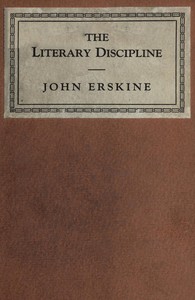The Literary Discipline by John Erskine
"The Literary Discipline" by John Erskine is a series of essays on literary criticism written in the early 20th century. This work explores the principles and responsibilities of literature as an art form, discussing themes such as decency, originality, and the interpretation of human experience through written expression. The author draws on both classical and contemporary literary figures and philosophies to articulate his views, aiming to elevate literature as a reflective art
rather than mere documentation of life. The opening of the work lays out the author’s mission to define and examine the concept of decency in literature, particularly amidst contemporary debates over censorship and moral standards. Erskine identifies two opposing sides: the moralists, who advocate for the suppression of what they deem indecent, and the writers, who often reject any form of restriction. He emphasizes the need for a clear definition of decency within literary contexts and invites writers to articulate their own understanding of decorum, suggesting that true decency in art lies not in mere emotional response but in the respect for the limitations inherent in communication through language. The discussion sets the stage for examining how literary expression can navigate complex human experiences while maintaining artistic integrity. (This is an automatically generated summary.)
Read or download for free
| How to read | Url | Size | |||
|---|---|---|---|---|---|
| Read now! | https://www.gutenberg.org/ebooks/62991.html.images | 233 kB | |||
| EPUB3 (E-readers incl. Send-to-Kindle) | https://www.gutenberg.org/ebooks/62991.epub3.images | 220 kB | |||
| EPUB (older E-readers) | https://www.gutenberg.org/ebooks/62991.epub.images | 217 kB | |||
| EPUB (no images, older E-readers) | https://www.gutenberg.org/ebooks/62991.epub.noimages | 145 kB | |||
| Kindle | https://www.gutenberg.org/ebooks/62991.kf8.images | 286 kB | |||
| older Kindles | https://www.gutenberg.org/ebooks/62991.kindle.images | 258 kB | |||
| Plain Text UTF-8 | https://www.gutenberg.org/ebooks/62991.txt.utf-8 | 207 kB | |||
| Download HTML (zip) | https://www.gutenberg.org/cache/epub/62991/pg62991-h.zip | 200 kB | |||
| There may be more files related to this item. | |||||
Similar Books
About this eBook
| Author | Erskine, John, 1879-1951 |
|---|---|
| LoC No. | 23008332 |
| Title | The Literary Discipline |
| Note | Reading ease score: 53.3 (10th to 12th grade). Somewhat difficult to read. |
| Contents | Preface -- Decency in literature -- Originality in literature -- The cult of the natural -- The cult of the contemporary -- The characters proper to literature. |
| Credits |
Produced by Charlene Taylor and the Online Distributed Proofreading Team at https://www.pgdp.net (This file was produced from images generously made available by The Internet Archive/American Libraries.) |
| Language | English |
| LoC Class | PN: Language and Literatures: Literature: General, Criticism, Collections |
| Subject | Literature |
| Subject | Literature -- History and criticism |
| Category | Text |
| EBook-No. | 62991 |
| Release Date | Aug 21, 2020 |
| Copyright Status | Public domain in the USA. |
| Downloads | 139 downloads in the last 30 days. |
| Project Gutenberg eBooks are always free! | |


